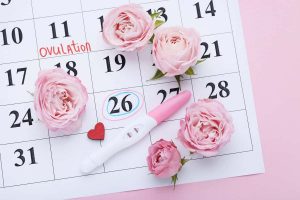“I don’t hear a heartbeat. I’m sorry, guys.”
These were the words my OBGYN said at our first 8-week pregnancy appointment. It was the first ultrasound; the first time we’d seen our baby—it was there on the screen, but there was no heartbeat.
And just like that, she put the ultrasound wand away, and our pregnancy was over.
My husband was bummed, but he took comfort in the fact that we could try again.
I, on the other hand, was a mess. I was not prepared for this loss and knew nothing about coping with miscarriage grief.
In the weeks and months following our miscarriage, all I could think about was trying to conceive (TTC) again. I was desperate to get back on the horse and follow the same trajectory.
When my period still hadn’t returned two months after the loss (in fact, it was normal for me to go several months without a period), my doctor referred us to a Reproductive Endocrinologist (RE) for additional testing.
Several blood tests and ultrasounds later and the RE had a diagnosis for us—I have PCOS, or polycystic ovary syndrome. Read more about PCOS and infertility, as it can make conception more complicated.
My RE was confident that with a few rounds of medicated cycles, we would be pregnant again and said we could start TTC after miscarriage whenever we were ready.

This site contains affiliate links, meaning that we earn a small commission for purchases made through our site. We only recommend products we personally use, love, or have thoroughly vetted.
TTC After Miscarriage
Our first cycle with Clomid and timed intercourse began the day of that appointment, about three months after the miscarriage.
In all honesty, I would have started much sooner if we’d had the diagnosis sooner. And without the need for a diagnosis, I also would’ve tried again sooner.
When can you try to conceive after a miscarriage?
According to the American Pregnancy Association, most doctors suggest waiting a few months before trying again.
The norm used to be to recommend three months, but many doctors now only recommend waiting one full menstrual cycle before trying again. In other words, once your period comes, you can try the next cycle.
One reason for waiting, according to the Mayo Clinic, is that most people are told to avoid sex for at least two weeks after miscarriage due to risk of infection.
Many families are anxious to start trying to conceive immediately after loss, but there are two other primary reasons that most doctors suggest waiting longer.
- Mental health: pregnancy loss takes a serious emotional toll, and that takes time to work there. Pregnancy anxiety after miscarriage is also often heightened compared to pregnancy with no history of loss, so it’s important to be emotionally prepared before trying again.
- Dating a new pregnancy: if you become pregnant after miscarriage without having a full cycle first, it can be hard to determine when you conceived because your body wasn’t working on its typical ovulation schedule. Being unsure how far along you are can be complicated for your doctor during early pregnancy, and it can cause extra anxiety for the parents.
To determine when you can try again, consult with your doctor. They can make a good recommendation based on your medical history.
But if you aren’t happy with their answer, ask for their reasons. Advocate for yourself as a patient, but also work to find a care provider you can really trust and talk to during this difficult time.
My Experience TTC After Loss
That first cycle, I operated with blinders on. I could think of nothing except ensuring and hoping that this cycle would work.
I was so optimistic and did nothing to protect my own heart and prepare myself for a potentially negative outcome.
During the final week of the two week wait (2ww), I started noticing some unusual early pregnancy signs that I thought HAD to mean that when I tested, it would be positive.
But it was negative.
And I was shocked.
Again, I wasn’t prepared for the heartbreak. I cried for the entire day. The next day, my period started (and the crying made a little more sense).
But realize that this is not just a hormonal reaction–you have a lot of emotions tied into getting pregnant, and especially getting pregnant after loss. That’s normal, and it’s okay.
I got pregnant again through our next cycle, which resulted in another miscarriage—a “biochemical pregnancy,” which is when the pregnancy test is positive and hCG levels start to rise, only to fall shortly after. A gestational sac never forms, and it cannot be seen on an ultrasound.
After the biochemical pregnancy, we proceeded a bit more cautiously. It took a month before diving back in (hey, I was cautious but not undeterred).
We recently finished our first cycle since the most recent loss, which did not result in a pregnancy, and we’ve decided to take a break from treatment for at least three months.
How Likely Am I To Have Back-to-Back Miscarriages?
Having just read about my experience, I know many of you are not wondering about he risk of miscarriage in your pregnancy after loss.
While recurrent miscarriages certainly occur, the good news is that back-to-back repeated miscarriages are rare. According to Resolve: The National Infertility Association, the risk of two miscarriages at any time is only 5%, and the risk of 3 losses is less than 1%.
In other words, 95% of pregnancies after loss will result in a live birth.
TTC After Loss is a State of Being
That might sound like a weird statement to make, but I’m learning that after 18 months and two miscarriages, trying to conceive can easily take over your life.

Although your losses were not your fault, and we promise you that stress did not cause them (despite the obnoxious things our society likes to tell us). Still, many women feel the need to make lifestyle changes after miscarriage.
Such changes can be healthy if they help you cope emotionally and don’t enhance any unnecessary feelings of guilt.
In my own experience, I have changed my diet and drinking habits, my exercise regimen, and I now take a crazy number of supplements every day—all in the hopes of one day having a successful pregnancy.
Even when I’m remaining cautious about a cycle’s chance for success, I am still researching every symptom, talking to other women who are in a similar spot, listening to fertility podcasts…the list goes on.
For those who have fertility issues or have suffered pregnancy loss, trying to conceive is not a world you re-enter haphazardly.
We all want our next attempts to result in healthy babies, so preparing yourself to TTC often becomes a way of life and state of being.
Questions that Come With TTC After Loss
TTC after loss comes with many other questions and factors that I didn’t consider when we first started out on this journey, but that I now contemplate with every cycle:
- What if we don’t get pregnant again?
- What if we DO get pregnant again?
- What if we have another loss?
- Why are we doing this to ourselves? Wouldn’t it be easier to give up?
Please understand that it’s completely normal to ask these questions and struggle with the answers.
That said, if you find yourself obsessing over these ideas, please contact your healthcare provider to determine if you would benefit from mental healthcare.
Taking a Break When You Need to is SO Important
Thus the reason for our self-imposed fertility hiatus—I am tired; WE are tired. I need a break from obsessing over pregnancy and instead try to find something different to occupy my time.
When I talked with my therapist recently, she asked about what I want to focus on now that we won’t be TTC for a while, and I had no idea what to tell her.
That (among other things) is what tells me that taking this break is a good move.
Resources for TTC After Miscarriage
We all know that TTC, infertility, and miscarriage can feel so isolating. If you have recently miscarried, I am so, so sorry. My heart goes out to you.
We have tremendous resources to help you, so please read our miscarriage articles and miscarriage stories. If you need further support, check out our guided grief journal for women experiencing pregnancy loss.
If you are considering TTC after a recent loss, talk to your doctor about what is right for your body. Everyone deals with different circumstances.
You might want to try again right away, but your doctor may recommend waiting a few months.
Come up with a plan together that you are comfortable with and ensures your health first and foremost.
That being said, you may want to be armed with your own information. These resources can help get you started:
- Curious about considerations before trying again? Check out this article by Ava Women.
- Looking for a support group (or a few)? This article on miscarriage support groups is a great place to start.
- Learn about pregnancy after miscarriage to help yourself emotionally prepare
Want to learn more about fertility overall? These podcasts are informative, and some will even make you laugh (something we don’t do often enough throughout this journey):
We also love miscarriage-specific podcasts, though all the infertility ones above also cover miscarriage. Here are some of our favorites:
- Life After Miscarriage (stories of loss)
- Managing Miscarriage
- The Joyful Mourning
Remember, the Next Steps Are Your Decision
Believe me, I understand wanting to get back on the baby train right away.
During our one-month break after the second loss, I found out my sister-in-law was pregnant, and that was the reason I decided we were starting our next cycle.
I’m not proud of it. But I do understand the sense of urgency.
After a miscarriage, no one except you (in discussion with your doctor) can tell you when the time is right to start trying to conceive again.
I recommend allowing yourself to fully grieve the loss before setting a timeline to move forward. Above all, make sure that you are putting yourself and your heart first during this time.
Jumping back in will always be scary; there’s no way around it, unfortunately.
I hope that you have a solid support system to offer comfort when you need it (and even when you think you don’t). Remember, too, that Undefining Motherhood’s Facebook and Instagram pages are a great place to talk about your journey!
We are always here to listen.
If you’re comfortable with it, talk to a therapist or start journaling to unload some of the burden.
And, most importantly, always do what is right for you and don’t apologize for it.
Do you have any tips for surviving TTC after miscarriage? Share them with us in the comments!










